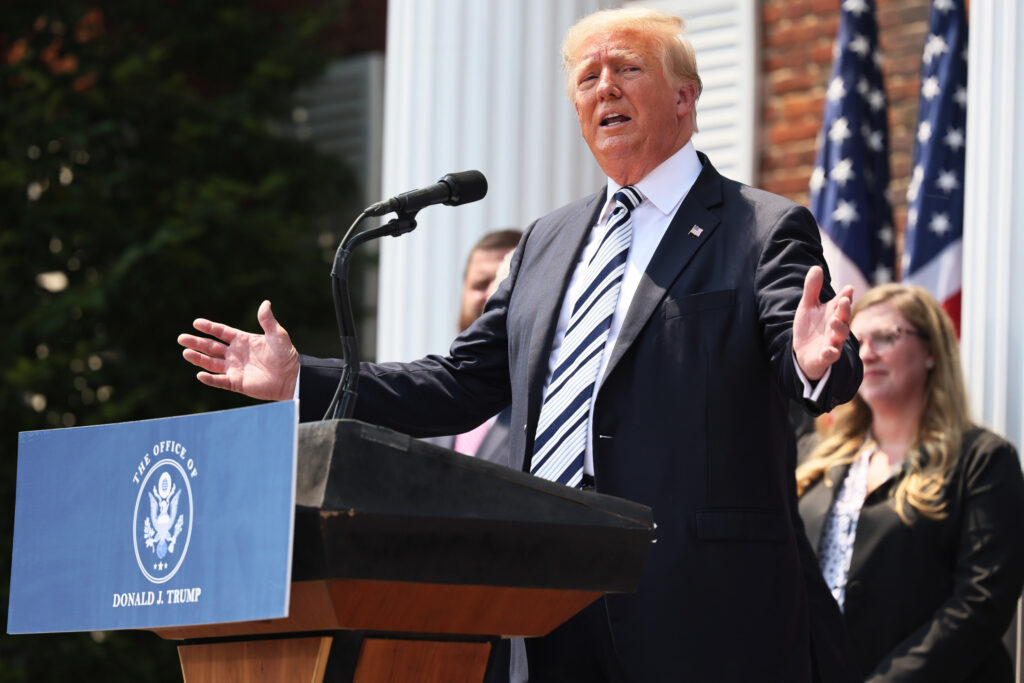Trump files class-action lawsuits against Facebook, Twitter and Google

|
Getting your Trinity Audio player ready...
|
Former U.S. President Donald Trump has filed three separate lawsuits against Facebook, Twitter and Google, along with their CEOs Mark Zuckerberg, Jack Dorsey and Sundar Pichai, alleging the tech giants unlawfully censor conservative voices.
Trump is seeking class action status for the lawsuits, meaning he would represent the interests of other users of Facebook, Twitter and Google’s YouTube who allege they have been “illegally banned or silenced”.
“We’re asking the US district court for the southern district of Florida to order an immediate halt to social media companies’ illegal, shameful censorship of the American people,” Trump said at the Trump National Golf Club in Bedminster, New Jersey.
“We’re demanding an end to the shadow banning, a stop to the silencing, a stop to the blacklisting, banishing and canceling that you know so well. Our case will prove this censorship is unlawful. It’s unconstitutional, and it’s completely un-American,” he added.
“We’re going to hold big tech very accountable. This is the first of numerous other lawsuits, I assume, that would follow.”
We’re going to hold big tech very accountable.
The First Amendment
The lawsuits argue that banning or suspending Trump and the other plaintiffs is a violation of the right to freedom of speech guaranteed by the First Amendment of the U.S. Constitution.
The First Amendment states that “Congress shall make no law … abridging the freedom of speech, or of the press.” The problem with relying on the First Amendment, therefore, is that Facebook, Twitter and Google are not Congress, but are private companies, and private companies cannot violate the First Amendment.
Trump tries to leapfrog this obstacle by arguing that the social media companies have worked so closely with federal entities that they have risen from private status to “state actor” status.
While there is growing concern over the vast power held by social media companies, Trump will be climbing a steep vertical wall as a federal appeals court already ruled in a separate case last year that YouTube doesn’t perform a public function.
“The bar for when a private party can be deemed a government actor for First Amendment purposes is set very high. While I think it is inadvisable for platforms to be consulting with government officials about content moderation as a general matter, nothing in the complaint rises to the level where Facebook’s actions could reasonably be attributed to the government. Ironically, the complaint includes the story of a plaintiff who was suspended after sharing an NIH link on Facebook—not exactly what you’d expect if Facebook was taking its marching orders from the federal government.”
Section 230
Trump’s lawsuits also ask the court for a declaration that Section 230 of the Communications Decency Act of 1996 is unconstitutional. Section 230 has been called the backbone of the internet because it gives providers of “interactive computer services”, which includes social media platforms, immunity from liability over content posted by third-party users.
Section 230 also contains a “Good Samaritan” provision which gives social media platforms immunity from civil liability if they moderate their content by removing posts that, for instance, are obscene or violate the platforms’ own standards, so long as they are acting in “good faith”.
Trump and other Republicans have long argued that Section 230 has given big internet companies too much legal protection. Trump signed an executive order last year designed to limit Section 230 protections, but Joe Biden revoked it in May.
While some commentators believe “some eventual reform of Section 230 seems likely“, others maintain Trump’s claim that Section 230 is unconstitutional lacks merit.
Chances of success
It is unlikely that Trump will actually accomplish much, except the publicity the lawsuits will generate, according to Forbes.
“Both of Trump’s claims are frivolous nonsense,” said Chicago attorney Ari Cohn, who specializes in First Amendment issues.
“The bar for when a private party can be deemed a government actor for First Amendment purposes is set very high,” explained Cohn. “Nothing in the complaint rises to the level where Facebook’s actions could reasonably be attributed to the government.”
“Section 230 is a wholly permissive law that does not dictate what types of content websites should moderate or how they should do so. The courts have been clear that a law enabling private actors to do something at their discretion, without any coercion by the government, doesn’t create a constitutional violation. On its face, Section 230 simply gives websites the discretion whether to moderate or not, and what rules to set if they do,” added Cohn.
This lawsuit is simply intended to stir up the ‘anti-big tech’ sentiments of his followers.
“This lawsuit is simply intended to stir up the ‘anti-big tech’ sentiments of his followers by way of a frivolous lawsuit that has no place being filed. Make no mistake: this lawsuit doesn’t defend the First Amendment. This lawsuit attacks it.”
Matt Schruers, the President of the Computer & Communications Industry Association, a tech industry trade group that includes Facebook, Twitter and Google, agreed that social media companies have every right to enforce their terms of service.
“Frivolous class action litigation will not change the fact that users — even U.S. Presidents — have to abide by the rules they agreed to,” Schruers said in a statement.
Trump was banned indefinitely from Twitter following the deadly Capitol Hill riot on January 6 2021. Facebook suspended the former president until at least January 7 2023, while Google-owned YouTube froze Trump’s account following the riot.

